Clark welcomes new faculty for 2022–23 academic year
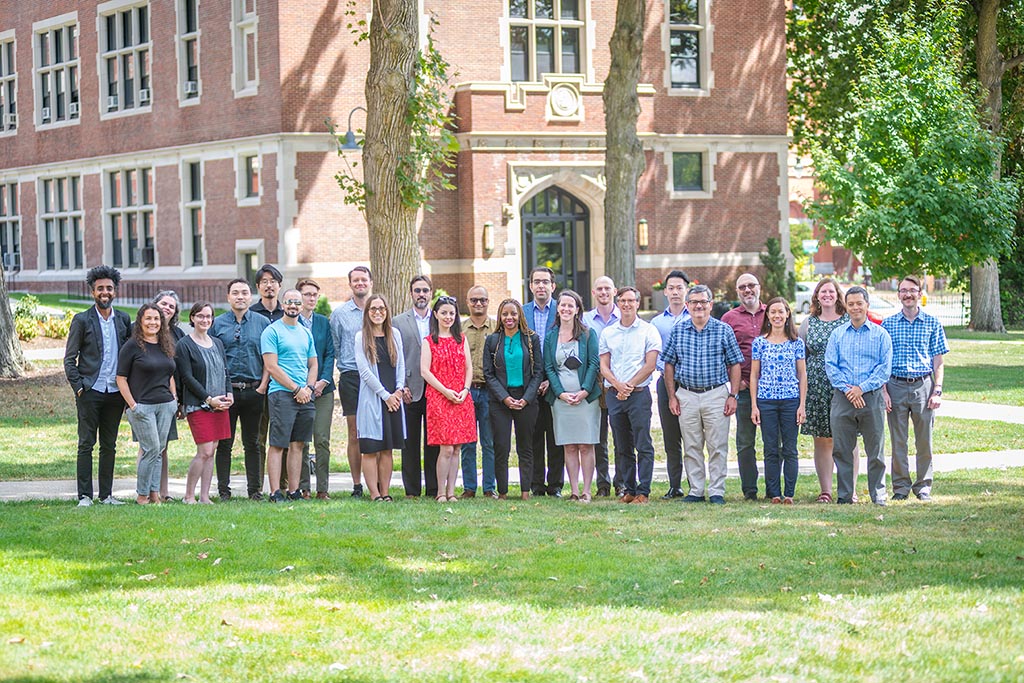
Clark University is pleased to welcome new faculty members for the 2022–23 academic year. These professors bring a wealth of knowledge and experience to departments across campus, from the sciences to the humanities, with expertise ranging from energy, sustainability, and ecological transformation to developmental economics and political theory, marketing and management, and race and ethnic studies.
Hamed Alemohammad
Associate Professor, Geography

Hamed Alemohammad is a remote sensing scientist with expertise in multispectral and microwave satellite observations. His research interests lie at the intersection of GIScience and geography, using observations and analytical methods to better understand the changing Earth system. In particular, he focuses on improving the characterization of the Earth system by enabling the fusion of multiple observations through uncertainty quantification of satellite observations; adapting machine learning techniques to advance data-driven analytics in Earth sciences; and soil moisture retrieval from synthetic aperture radar observations. Alemohammad joins Clark from Radiant Earth Foundation, where he was the chief data scientist and executive director in charge of developing Radiant MLHub. He earned his doctorate in civil and environmental engineering from MIT.
Eduard Arriaga
Associate Professor and Chair, Language, Literature, and Culture
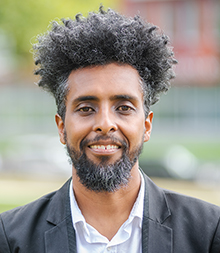
Eduard Arriaga develops interdisciplinary research at the intersection of fields such as critical race studies, Afro-Latinx and Afro-Latin American studies, digital studies, and digital humanities. He is currently writing a book examining the way Afro-Brazilian marginal communities, through hybrid and communal digital practices, challenge “algorithmic determinism” in search of data and social justice. As a scholar and instructor, Arriaga has worked at institutions in Colombia, Canada, and the U.S., including as associate professor and chair of the Global Languages and Cross-Cultural Studies Department at the University of Indianapolis. He has received a number of awards and honors, including the Institutional Leadership Award from the University of Indianapolis. Arriaga earned a master’s in Hispanic American Literature from the Caro y Cuervo Institute in Colombia and a doctorate in Hispanic studies and migration studies from the University of Western Ontario.
Julio M. D’Arcy
Assistant Professor, Chemistry and Biochemistry
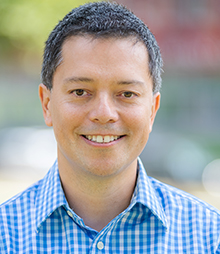
Julio D’Arcy’s research is driven by pressing questions about energy, sustainability, and the future; his laboratory applies synergistic overlaps between chemistry and engineering to study molecular interactions and new mechanistic pathways that result in conducting polymer nanoarchitectures. Prior to joining Clark, D’Arcy taught at Washington University in St. Louis in both the Department of Chemistry and the Institute of Materials Science and Engineering, where he developed cutting-edge syntheses and technologies in organic electronic and electrochemical energy storage. D’Arcy has served as principal investigator on 22 studies published in top peer-reviewed chemical and engineering journals and received the prestigious National Science Foundation CAREER award (2022), and is dedicated to fostering the next generations of researchers by working at the intersection of multiple disciplines. He was an MLK Postdoctoral Scholar at MIT and earned his doctorate from UCLA.
Ayan Ghosh Dastidar
Assistant Professor, School of Management
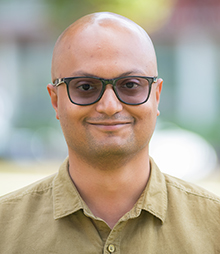
Ayan Ghosh Dastidar researches quantitative marketing strategy with a focus on digital and social media marketing, advertising, health care, place marketing, and the social implications of marketing. He uses methods such as econometric modeling and machine learning to study the spillover effects of marketing and to highlight its role in advancing social good. Prior to joining academia, he worked for the Hongkong and Shanghai Banking Corporation. Dastidar received the 2020 Best Doctoral Fellow Research Proposal Award at the Marketing Strategy Consortium, the Clyde Kitchens/Thoben Elrod/Delta Sigma Pi Doctoral Fellow Research Grant from Georgia State University, and the GTA Teaching Excellence Award from the J. Mack Robinson College of Business at GSU. Dastidar holds a master’s in applied statistics and informatics from the Indian Institute of Technology Bombay, and a doctorate in marketing from Georgia State University.
Jon Denton-Schneider
Assistant Professor, Economics
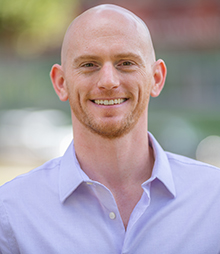
Jon Denton-Schneider studies development economics and economic history with an emphasis on human capital — especially health — in sub-Saharan Africa and Latin America. His research focuses on the historical causes and economic consequences of poor health in these regions, as well as the policies that can remedy its negative impacts. Denton-Schneider received a Fulbright grant to study the post-NAFTA business environment in Mexico. He holds a master’s in Latin American studies from the University of Arizona and earned his doctorate in economics from the University of Michigan, where he was a Weiser Emerging Democracies Fellow and a predoctoral trainee in economic demography in the Population Studies Center.
Mandy Gutmann-Gonzalez
Associate Professor of Practice, English
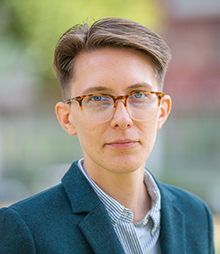
Mandy Gutmann-Gonzalez is a Chilean poet, novelist, translator, and text-based artist whose current poetry project, “Salem Songs,” uses 17th-century court records of the Salem Witch Trials to uncover the power and violence within the language of the legal system. Publications include “La Pava,” a novel, as well as work in a number of literary journals, including the “Best New Poets” anthology (2021), Colorado Review, Quarterly West, diode, and more. Gutmann-Gonzalez received the 2018 Boulevard Emerging Poets Prize and fellowships from the Bucknell Seminar for Younger Poets, Lambda Writing Retreat for Emerging LGBT Voices, and TAKT Residency in Berlin, among others. They are the founder and director of the Clark Poets and Writers Reading Series, which invites writers of color and queer/trans writers to Clark for readings and workshops. Gutmann-Gonzalez holds an MFA in poetry from Cornell University.
Joseph Guzman
Assistant Professor, Sociology

Joseph Guzman’s research focuses on the dynamics of race and class among African Americans and their social organizations. Through an ongoing ethnography of a Black social club, Guzman examines how sociability shapes the construction of Black masculinity and the tensions of navigating race- and class-based identities at the small group level and in relation to the larger Black community. In terms of economic and political mobilization, he uses archival methods to examine how organizational and contextual dynamics affect the emergence, persistence, and decline of local civil rights organizations. Guzman’s socio-historical work at the communal level explores the urban projects of Bronzeville — specifically, the emergence of Bronzeville as a concept; the influence of class, gender, and status; the dynamics of its development; and how it ultimately transcended local circumstances. Guzman holds both a master’s and doctorate in sociology from The Ohio State University.
Danielle Hanley
Assistant Professor, Political Science
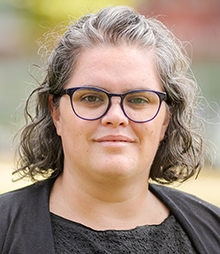
Danielle Hanley is a political theorist working at the intersection of ancient and contemporary political thought. Her work draws on multiple strands of feminist scholarship to understand the relationship between gender, emotions, and solidarity. She uses innovative readings of Greek tragedy to map the circulation of emotions like grief and rage in contemporary protest and resistance movements. She earned her doctoral and master’s degrees in political science from the University of Pennsylvania, as well as a master’s in political science from the Hebrew University of Jerusalem.
Erin McCullough
Assistant Professor, Biology
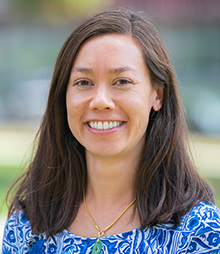
Erin McCullough is an evolutionary biologist and behavioral ecologist who researches patterns of morphological and behavioral diversity. She specializes in studying the evolution of reproductive traits and uses diverse and integrated approaches to explore the evolutionary forces that give rise to biodiversity at different levels of biological organization — from proteins and structures to populations and species. Before coming to Clark, McCullough was a postdoctoral researcher at Syracuse University and a National Science Foundation postdoctoral fellow at the University of Western Australia. She earned her doctorate in organismal biology and ecology from the University of Montana and a bachelor’s in biology from the University of Puget Sound.
Gustavo Oliveira
Assistant Professor, Geography
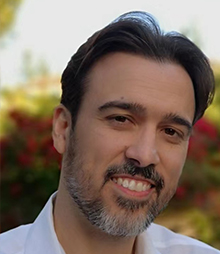
Gustavo Oliveira is a human-environment geographer whose research focuses on Chinese finance and investment in Brazilian agribusiness and infrastructure. He also studies critical geopolitics and the global political ecology of soy, pesticides, biofuels, land struggles, agroecology and food sovereignty, and environmental governance. A member of the United Nations Sustainable Development Solutions Network’s Science Panel for the Amazon, Oliveira is also co-principal investigator of a USDA-funded project on the COVID-19 pandemic’s impact on U.S. food supply chains. His current book project is “Brazil, China, and the Global Land Grab.” Before joining Clark, he taught at the University of California Irvine and Peking University, and was a postdoctoral fellow in environmental studies at Swarthmore College. Oliveira holds a doctorate in geography from the University of California Berkeley and a master’s in philosophy from the University of Colorado Boulder.
Max Ritts
Assistant Professor, Geography
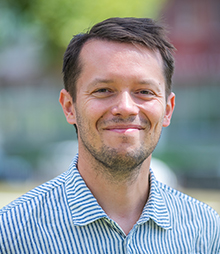
Max Ritts is an environmental geographer exploring the intersections of social power, sensory practice, and ecological transformation, with a particular focus on Indigenous community contexts. His current book project, “A Resonant Ecology,” is rooted in collaborations with communities on the north coast of British Columbia and examines the force of industrial development through situated enactments of sonic culture (e.g., eco-acoustics, whale song, industrial noise, and Indigenous heavy metal). He is developing a partnership with the Gitga’at First Nation to assess capacities for data sovereignty and socio-cultural well-being. Ritts also is co-editing “The Raven Stories,” an anthology that centers voices of young Indigenous scholars and critical Indigenous perspectives. Ritts comes to Clark from King’s College, University of Cambridge, where he was a college research associate. He received his doctorate in geography from the University of British Columbia.
Peter Story
Assistant Professor, Computer Science
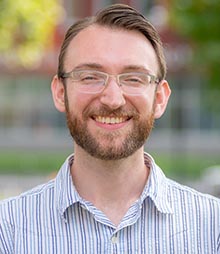
Peter Story researches usable security and privacy. As digital technologies become more intertwined with our lives, security and privacy have never been more important. People can protect themselves from digital threats by using protective technologies, such as secure mobile payment systems like Apple Pay and privacy tools like Tor Browser — however, protective technologies will not be widely adopted if they are misunderstood or difficult to use. Story’s work involves studying the strengths and weaknesses of protective tools as well as how people perceive them, and using behavioral nudges to encourage people to adopt effective tools. He holds a doctorate in societal computing from Carnegie Mellon University.
Minka Stoyanova
Assistant Teaching Professor, Becker School of Design & Technology
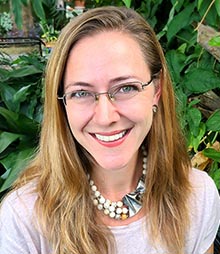
Minka Stoyanova is an artist-thinker and philosopher-maker who uses a cyborg-based perspective to investigate the real and speculative effects of technology in society. Her current research focuses on the use of augmented reality in urban environments. She was a Fulbright Research Scholar in Bulgaria and received a National Science Foundation Computing Innovation Fellowship at the University of Colorado Boulder. In addition to solo exhibitions and peer-reviewed journal publications, Stoyanova has presented artwork and papers in a variety of venues internationally, including China, Hong Kong, Germany, Bulgaria, and the United Kingdom. She has taught interactive media, creative coding, and critical approaches to technology at the Shanghai Institute of Visual Art, Loyola University New Orleans, and the University of New Orleans. Stoyanova holds an MFA from the Glasgow School of Art and a doctorate in creative media from the City University of Hong Kong.
Michael Swartz
Associate Teaching Professor, Becker School of Design & Technology
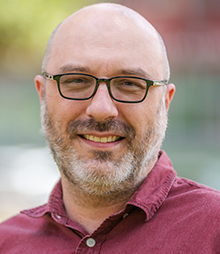
Michael Swartz is an award-winning digital media artist specializing in 3D animation, digital fabrication, and game art; his intersecting interests in art, science, music, photography, typography, and poetry fuel his passion for visual storytelling. His visual arts career has ranged from traditional illustration to creature design, character rigging, animation, environment design, lighting, and rendering for TV, film, games, and virtual reality. Swartz recently recreated historical artifacts for a virtual reality game about the creation of the Hoover Dam, and his interactive virtual tour of Abolition Row for the Black Spaces Matter project is on permanent display in New Bedford, Massachusetts. Current projects include an illustrated poetry book, an animated short film, “Lost Words,” and a book about 3D printing and lost wax bronze casting. He received his MFA in computer art, specializing in 3D animation and visual effects, from the School of Visual Arts in New York City.
Spencer Tricker
Assistant Professor, English
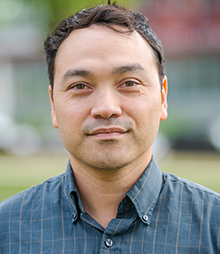
Spencer Tricker’s research examines issues of race, imperialism, and immigration in 19th-century American literature. His current book manuscript explores the uses and abuses of internationalist rhetoric and feeling in the work of writers and public figures from the United States, Canada, the Philippines, and Hawaii. His awards include a Hennig Cohen Prize from the Melville Society and a summer institute fellowship from the National Endowment for the Humanities. Tricker comes to Clark from Longwood University in Virginia, where he helped launch a new minor in race and ethnic studies, serving as the program’s co-director from 2021 to 2022. He earned his doctorate in English from the University of Miami.
Ruixiang Wang
Assistant Professor, School of Management
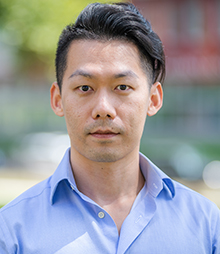
Ruixiang Wang’s research covers innovation, corporate governance, and executive compensation. He also is interested in understanding asset prices by modeling households’ consumption behavior. He has presented his research at prestigious academic conferences, including those organized by the American Finance Association and Northern Finance Association. Wang received the Winemiller Excellence Award in Data Analytics in 2020 and was a semifinalist for the 2021 Best Paper Award from the Financial Management Association. Prior to coming to Clark, he was a visiting assistant professor of finance at Northeastern University. Wang earned his doctorate in business administration at the University of Missouri Columbia and an MBA at the University of San Diego.
A number of visiting faculty members also are joining the campus community for this academic year, including:
- Ibrahim Ozdemir, Center for Gender, Race, and Area Studies
- Asya Darbinyan, Strassler Center for Holocaust and Genocide Studies
- Kisuk (Jeff) Noh, English
- Melinda Marchand, History
- Anna Mullany, International Development, Community, and Environment
- Bright Nkrumah, International Development, Community, and Environment
- Theyab Alhwiti, School of Management
- Ozlem Hesapci Karaca, School of Management
- Claudia Chilundo, School of Management
- Kathy Fogel, School of Management
- Edward Cohen, Political Science
- Ilana Rothkopf, Political Science
- Nicole Baker, Psychology
- Lee Stevens, Psychology
- Matthew Gregory, Sociology
- Katherine Harrington, Visual and Performing Arts


